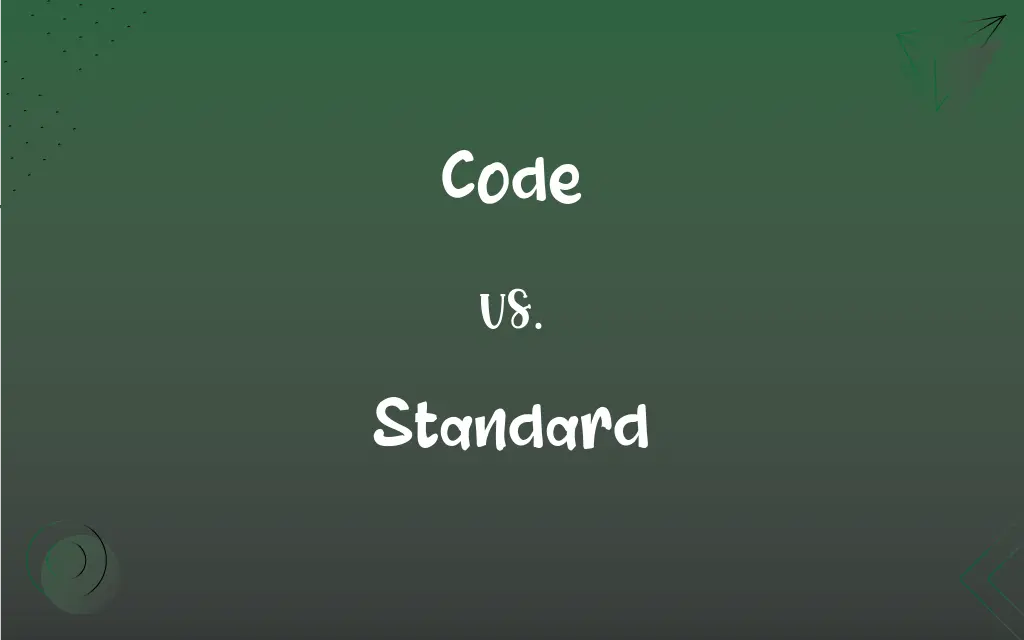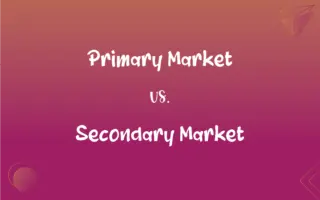Code vs. Standard: What's the Difference?
Edited by Aimie Carlson || By Harlon Moss || Updated on October 22, 2023
Code is a system of rules or symbols used for representation or regulation, while standard is a level of quality or a recognized measure to which comparisons are made.

Key Differences
Code and standard are both terms associated with rules, benchmarks, and guidelines. A code typically represents a set of rules or guidelines to be followed, while a standard denotes a level of quality or accepted norms against which something can be judged.
In the context of regulations, a code might be a documented set of criteria to be followed, such as a building code. On the other hand, a standard would represent an accepted level of quality or procedure, often established by professional organizations or industry bodies.
If we delve into the realm of communication, a code signifies a system of symbols or signs used to convey a message. In contrast, a standard in communication might relate to a widely accepted protocol or format, ensuring consistency and interoperability.
Within the realm of computing, a code can refer to the written program or software that executes specific tasks. Meanwhile, a standard in this domain might point to common practices or protocols that software and hardware products follow to maintain compatibility.
To summarize, while both code and standard encompass rules or guidelines, a code often embodies directives or instructions, and a standard sets the benchmark or quality level.
ADVERTISEMENT
Comparison Chart
Primary Usage
Represents a set of rules or guidelines.
Denotes a level of quality or accepted norms.
Example Context
Building codes, programming.
Quality assurance, industry norms.
Nature
Directive or instructional.
Benchmark or comparative.
In Communication
System of symbols for conveying messages.
Accepted protocols ensuring consistency.
In Computing
Written program or software.
Common practices or protocols for compatibility.
ADVERTISEMENT
Code and Standard Definitions
Code
A set of regulations or principles governing conduct.
The company operates under a strict code of ethics.
Standard
A level of quality or measure of excellence.
Their work is always of the highest standard.
Code
A system of words or numbers used to convey secret information.
Spies often communicate using a secret code.
Standard
A banner or emblem used as a symbol.
The army rallied around their standard.
Code
A system of symbols or rules for communication.
Morse code uses dots and dashes to represent letters.
Standard
A rule or principle considered to be universally accepted.
Meeting environmental standards is essential.
Code
A written program for computers.
She wrote a code to automate the task.
Standard
An accepted or approved model.
The car comes with standard features.
Code
A standard set of criteria in specific fields.
The building must comply with the fire safety code.
Standard
A musical composition set for consistent popularity.
That song has become a jazz standard.
Code
A system of signals used to represent letters or numbers in transmitting messages.
Standard
Serving as or conforming to an established or accepted measurement or value
A standard unit of volume.
FAQs
What does "standard" mean in the automotive industry?
In automotive contexts, "standard" often refers to baseline features or specifications of a vehicle model.
Can "code" relate to ethics?
Yes, there are "codes of ethics" which outline moral principles and guidelines for conduct.
Can a "standard" be an established practice?
Yes, a "standard" can refer to an accepted method or practice in a particular industry or field.
What does "standard" imply in quality assurance?
In quality assurance, "standard" denotes a set level of quality or criteria that products or processes must meet.
Can a "code" be secret?
Yes, codes can be systems of symbols or numbers used to convey secret or encrypted information.
Does "standard" always mean the best?
No, "standard" refers to an accepted norm or benchmark, which might not always represent the absolute best.
Is a "code" only about rules?
No, while codes often outline rules, they can also be systems for representation, like Morse code.
Can "standard" refer to a flag or banner?
Yes, historically, a "standard" could mean a banner or emblem, especially in a military context.
Do "standards" evolve over time?
Yes, standards can evolve based on advancements, research, and changing industry needs.
Can a "code" refer to software?
Yes, in computing, a "code" often refers to a written program or script.
Is every "code" written down?
Not necessarily. While many codes are documented, some, like unwritten social codes, are understood without formal documentation.
Can "code" be used in legal contexts?
Yes, there are legal codes that consolidate laws on specific topics.
Is Morse code a language?
No, Morse code is not a language but a system of representing letters and numbers using sequences of dots and dashes.
Are "code" and "standard" synonyms?
No, while both relate to rules or guidelines, "code" is about specific directives, and "standard" sets a benchmark or quality level.
Can codes be based on standards?
Yes, codes can be developed based on prevailing industry standards.
Is there a "standard" for languages?
Yes, languages can have standard dialects or forms which are considered the norm, especially in formal contexts.
Can "standard" refer to a musical piece?
Yes, a "standard" can be a musical composition recognized for its enduring popularity.
Is a programming "code" always complex?
No, a code in programming can range from simple to complex, depending on the task.
Can there be a "code" in fashion?
Yes, there can be dress codes that outline acceptable attire for specific situations.
Can industries have their own "standards"?
Yes, industries often develop standards to ensure quality, safety, and interoperability within the sector.
About Author
Written by
Harlon MossHarlon is a seasoned quality moderator and accomplished content writer for Difference Wiki. An alumnus of the prestigious University of California, he earned his degree in Computer Science. Leveraging his academic background, Harlon brings a meticulous and informed perspective to his work, ensuring content accuracy and excellence.
Edited by
Aimie CarlsonAimie Carlson, holding a master's degree in English literature, is a fervent English language enthusiast. She lends her writing talents to Difference Wiki, a prominent website that specializes in comparisons, offering readers insightful analyses that both captivate and inform.































































